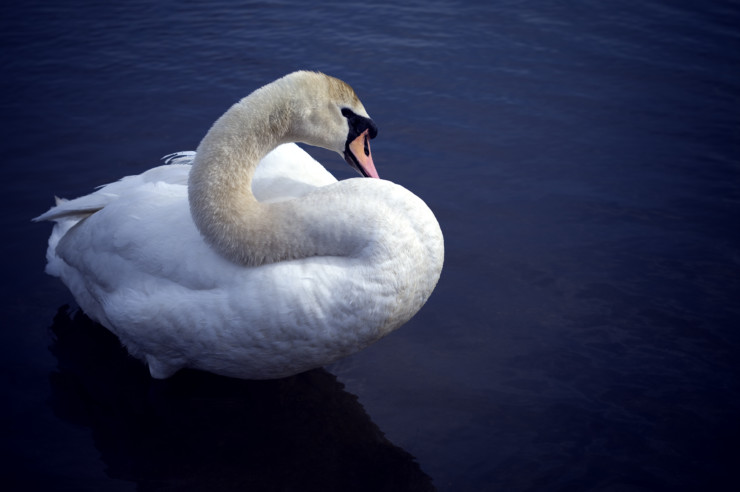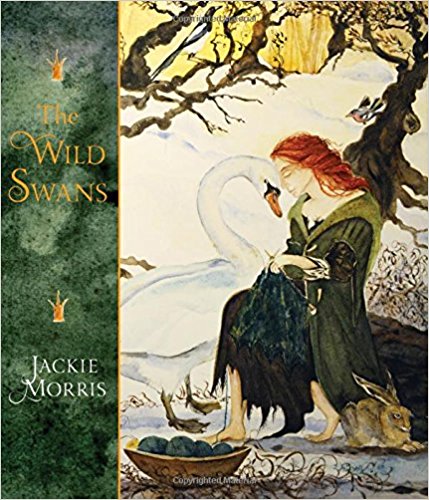
It is risky, one could say, to take counsel from a fairie queen. But then again, when a girl has been enchanted right out of her father’s arms — and home — by a jealous woman of the woodland with magical powers of her own and all of her siblings have been turned into swans and flown far away, it’s not unreasonable to think that the girl might take advice wherever she could find it. Even if it comes from a legendary queen known for her beauty as much as her deadly ways.
The thing is, counsel from this sort of person is never going to be easy. And the help that our girl Eliza received from Morgana, Queen of the Fae Folk, in The Wild Swans, does not deviate from that truth.
The advice is hard. The tasks given fit various definitions of impossible. Gather stinging nettles. Stamp them into flax with your bare feet. Weave the flax into thread and knit shirts with it. Find the swans before you’re killed in an ill-fated episode of palace intrigue. Oh, and don’t utter a word this whole time.
In Jackie Morris’ reimagining of the classic fairy tale, Morgana warned Eliza the challenge ahead would not be easy. “Do you think you are brave enough, strong enough, fierce enough?”
The girl feared she’d be called upon to face monsters. She would, in a way, though the monster she would face had no scales nor sharp teeth nor horns.
Eliza’s monster? Time.
“You will require the patience of water, if you wish to break this curse,” the Fairie Queen told her.
The patience of water.
“The waves have no heart, some think. Water has no soul and yet,” Morgana explained, “given time it can break and shape stone. Pebbles on the beach are rubbed smooth through years in the hands of the sea, rocks on land splintered by ice and water and wind working together.”
The impossibilities of the task may have momentarily, at least in the abstract, sounded doable. The terrors may have seemed endurable. But introduce the monstrosity of time, and not just a little like “Meet me back here with the nettle-knit shirts on Tuesday.” Real, ever-turning calendar pages kind of time.
“Are you willing to take on such a task? To give years of your life to it?”
Years of your life.
If Eliza could meet Morgana, who appears in dozens of other tales, perhaps it’s not inconceivable she also knew of another hero who took on the monstrosity of time, who offered himself to the patience of water. In The Odyssey’s epic tale, Odysseus gave 10 years of his life after the fall of Troy to his long journey home to Ithaca. In some ways, Eliza’s quest to rescue her brothers was her Ithaca. C.P. Cavafy, who wrote a poem after Homer’s Odyssey, doesn’t encourage us to have patience, explicitly, as Morgana did. Rather, in Ithaka, he invites the reader to hope for a long journey.
As you set out for Ithaka
hope your road is a long one,
full of adventure, full of discovery.
He goes on to suggest that Ithaka, while it is the destination, is also the journey, one to be cherished no matter the hardship:
Keep Ithaka always in your mind.
Arriving there is what you’re destined for.
But don’t hurry the journey at all.
Better if it lasts for years,
so you’re old by the time you reach the island,
wealthy with all you’ve gained on the way,
not expecting Ithaka to make you rich.
Ithaka gave you the marvelous journey.
Without her you wouldn’t have set out.
She has nothing left to give you now.
And if you find her poor, Ithaka won’t have fooled you.
Wise as you will have become, so full of experience,
you’ll have understood by then what these Ithakas mean.
In Morris’ retelling, if the moment of rescue is Eliza’s Ithaca, it is also the beginning of yet another journey. Release from the curse cut short her brother’s dream. After Eliza’s long exercise in patience, Cygfa now must have the “patience of water” and embark on a journey toward an Ithaca of his own.
* * *
This month, we’re exploring a fairy tale theme, with our group Poetry Dare to commit The Stolen Child by W. B. Yeats to memory and our two-week book club discussion of The Wild Swans, by Jackie Morris. We invite you to share your thoughts on the story (perhaps you love the original) or on the twists and deeper explorations in Jackie Morris’ retelling. And since it’s National Poetry Month, we also invite you to share poems from the story — a poem inspired by the story or a character, a poem written to the fairy tale, or a found poem you’ve gathered from the book’s lyrical prose. Check out our first discussion, I Did Love to Fly. Drop your poem(s) in the comment box. Here’s one to get you started:
Part of the patience of water
is unknowing
which rocks are split
or pebbles smoothed
and on which shore
will it turn up today,
coming in waves that pound
or caught up in clouds
that let go in sprinkles
or deluge, running downstream
only to turn to ice
with much warning,
just the gradual stiffening
that comes from flowing
whichever way
the wind will take you
Photo by Hiroyuki Takeda, Creative Commons via Flickr. Post and poems by Will Willingham, author of Adjustments: a novel.
__________________________
Adjustments is more than a good novel; it is a fine novel. It is, simultaneously, moving and real and surprising and true. We see ourselves and our personal histories in Will Phillips, Joe Murphy, and Pearl Jenkins. Like Will, we bear scars. In Joe, Pearl, and Cameron, we experience offered hope. This is a story about what matters, and it’s told beautifully well.
—Glynn Young, author of the Dancing Priest series.
- Earth Song Poem Featured on The Slowdown!—Birds in Home Depot - February 7, 2023
- The Rapping in the Attic—Happy Holidays Fun Video! - December 21, 2022
- Video: Earth Song: A Nature Poems Experience—Enchanting! - December 6, 2022


L.L. Barkat says
The story is such a good way to think about the life of an artist. Those shirts she made were things of amazing beauty. It took body and soul (and the patience of water) to make them.
They were so beautiful that they broke curses. And yet, for one boy, the thrusting-upon-him of the exquisite garment stole body and soul.
Certainly something to think on as we share our artistic “gifts” with the world. Beauty doesn’t permit us a pass on attention and sensitivity: even the beautiful is no gift when it’s not wanted.
Will Willingham says
When it’s not wanted…
Such a necessary recognition. 🙂
Bethany R. says
“Eliza’s monster? Time.
‘You will require the patience of water, if you wish to break this curse,’ the Fairie Queen told her.
The patience of water.”
Intriguing post. I like the juxtaposition of the view on time in Ithaca.
Will Willingham says
Ithaca came into play sort of coincidentally, and yet it seemed like there was something that connected here. 🙂
Laura says
I sat down and read this book all in one sitting. It was a delight to let go of this world and live in the world of fairytale for a while. I love the depth of these time-worn tales–one reason I love, love, love Women Who Run With the Wolves.
I was frustrated so many times by Eliza’s muteness, especially when she suffered the abuse at the hands of the priest. It made me aware of how, so many times in this world, we blame the victim, want to magic their circumstances into something other than they are. If only they would, why don’t they just, what keeps them from … In Eliza’s case, it was the certain loss of her brothers that kept her silent. In our times, the perils are not so neatly presented.
And this, L.W.? If we can master loving the journey over the destination, why then I think we will have discovered the secret of life.
Thanks so much for suggesting this book. The reading was a little bit of play in my day.
Will Willingham says
This would be my most favorite fairy tale. I didn’t discover it until I was an adult (and most fairy tales scared the dickens out of me as a kid, still do, and so I’m not sure I’d have benefited from this one then. 😉 ) but Morris’ version of it explores some of the other layers of this story in such a remarkable way.
I appreciate what you’re saying her about her inability to speak, to explain herself, to defend herself (from the priest, yes, but even from the well-intentioned prince who took her from the forest and away from her brothers).
Journey over destination. Yes. If that’s how we look at it, then we will have always arrived. 🙂